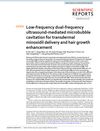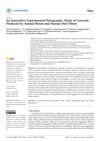 17 citations,
April 2017 in “International Journal of Biological Macromolecules”
17 citations,
April 2017 in “International Journal of Biological Macromolecules” Monoolein-alginate beads help heal wounds by controlling moisture and effectively delivering adenosine to the skin.
 17 citations,
August 2015 in “Journal of steroid biochemistry and molecular biology/The Journal of steroid biochemistry and molecular biology”
17 citations,
August 2015 in “Journal of steroid biochemistry and molecular biology/The Journal of steroid biochemistry and molecular biology” The study found that urine metabolites M1b or M4 are the best indicators of ATD use in horses, with detection possible up to 77 hours in urine and 28 hours in blood.
 16 citations,
May 2020 in “Frontiers in pharmacology”
16 citations,
May 2020 in “Frontiers in pharmacology” Minoxidil can stop the growth of ovarian cancer cells without harming the heart.
 16 citations,
September 2018 in “Scientific reports”
16 citations,
September 2018 in “Scientific reports” Scientists created keratinocyte cell lines from human hair that can differentiate similarly to normal skin cells, offering a new way to study skin biology and diseases.
 15 citations,
January 2020 in “ACS Applied Materials & Interfaces”
15 citations,
January 2020 in “ACS Applied Materials & Interfaces” Nanofiber structure helps regenerate hair follicles.
 15 citations,
July 2017 in “PubMed”
15 citations,
July 2017 in “PubMed” Injecting a mix of human skin and hair cells into mice can grow new hair.
 15 citations,
January 2016 in “Biological & Pharmaceutical Bulletin”
15 citations,
January 2016 in “Biological & Pharmaceutical Bulletin” Bee venom helps hair grow and may work better than some common treatments.
 15 citations,
January 2002 in “Gynecological endocrinology”
15 citations,
January 2002 in “Gynecological endocrinology” Hormones affect skin aging and fat distribution, and treatments can help, but only minoxidil is proven for female hair loss.
 14 citations,
December 2020 in “Journal of Investigative Dermatology”
14 citations,
December 2020 in “Journal of Investigative Dermatology” Aging causes changes in the scalp that can affect hair growth and lead to older-looking hair in women.
 14 citations,
March 2020 in “Scientific Reports”
14 citations,
March 2020 in “Scientific Reports” Using dual-frequency ultrasound with microbubbles can potentially improve the delivery of hair growth treatment through the skin and enhance hair growth.
 14 citations,
March 2019 in “Plant methods”
14 citations,
March 2019 in “Plant methods” The new microrhizotron tool effectively observes and measures pepper plant roots non-destructively.
 14 citations,
October 2018 in “PloS one”
14 citations,
October 2018 in “PloS one” Deleting the Far2 gene in mice causes sebaceous gland issues and patchy hair loss.
 14 citations,
April 2016 in “Cell Transplantation”
14 citations,
April 2016 in “Cell Transplantation” Neural stem cell extract can safely promote hair growth in mice.
 14 citations,
May 2011 in “Drug Metabolism and Disposition”
14 citations,
May 2011 in “Drug Metabolism and Disposition” Ketoconazole increases finasteride's effectiveness and lifespan in the body.
 14 citations,
April 2006 in “Expert Review of Dermatology”
14 citations,
April 2006 in “Expert Review of Dermatology” Antiandrogen therapy helps treat genetic hair loss.
 13 citations,
July 2022 in “Frontiers in cell and developmental biology”
13 citations,
July 2022 in “Frontiers in cell and developmental biology” Tiny natural vesicles from cells might help treat hair loss.
 13 citations,
January 2015 in “Molecular Pharmaceutics”
13 citations,
January 2015 in “Molecular Pharmaceutics” Minoxidil works well as a high permeability reference drug for biopharmaceutics classification.
 13 citations,
August 2013 in “Journal of pharmaceutical sciences”
13 citations,
August 2013 in “Journal of pharmaceutical sciences” Researchers created a skin patch that delivers two drugs for treating enlarged prostate, which may improve patient use and dosage control.
 12 citations,
December 2017 in “Food and chemical toxicology”
12 citations,
December 2017 in “Food and chemical toxicology” Permanent hair dye mixtures can irritate and damage the skin.
 11 citations,
July 2021 in “Sustainability”
11 citations,
July 2021 in “Sustainability” Concrete made from animal bones and human hair is stronger and more environmentally friendly than traditional concrete.
 10 citations,
September 2020 in “Metabolites”
10 citations,
September 2020 in “Metabolites” Hair color and length affect metabolite profiles in hair, so they should be considered in hair analysis.
 10 citations,
July 2019 in “Journal of Asia-Pacific Entomology”
10 citations,
July 2019 in “Journal of Asia-Pacific Entomology” Different silkworm varieties have varying nutrient levels in their powders, which may promote hair growth.
 10 citations,
January 2017 in “Journal of Evidence-Based Complementary & Alternative Medicine”
10 citations,
January 2017 in “Journal of Evidence-Based Complementary & Alternative Medicine” Some vegetables from Northern Thailand show promise for health benefits, including hair loss treatment and antioxidant properties.
 10 citations,
October 2015 in “Medicina Clínica (english Edition)”
10 citations,
October 2015 in “Medicina Clínica (english Edition)” Recombinant human epidermal growth factor is versatile, effective, and safe for long-term skin and mucosal treatments.
 10 citations,
August 2015 in “Journal of biophotonics”
10 citations,
August 2015 in “Journal of biophotonics” Hair follicles help substances penetrate the skin faster and more effectively.
 10 citations,
May 2015 in “International Journal of Women's Dermatology”
10 citations,
May 2015 in “International Journal of Women's Dermatology” New treatments for skin and hair disorders in women of color address unique biological differences and include specific acne medications, sunscreens, skin lighteners, and hair care adjustments.
 10 citations,
November 2014 in “Journal of Dermatological Treatment”
10 citations,
November 2014 in “Journal of Dermatological Treatment” Polyphenols may help treat skin conditions like warts, hair loss, acne, and dark spots, but more research is needed.
 10 citations,
August 2014 in “Skin research and technology”
10 citations,
August 2014 in “Skin research and technology” Sleep, testosterone levels, and a specific enzyme activity affect skin oil production in women.
 10 citations,
January 2014 in “Endocrinology & metabolic syndrome”
10 citations,
January 2014 in “Endocrinology & metabolic syndrome” PCOS is a long-term condition that needs more research for better understanding and treatment.
 10 citations,
September 2013 in “Nutrition”
10 citations,
September 2013 in “Nutrition” The ketogenic diet can worsen biotin deficiency, suggesting a need for biotin supplements.






























